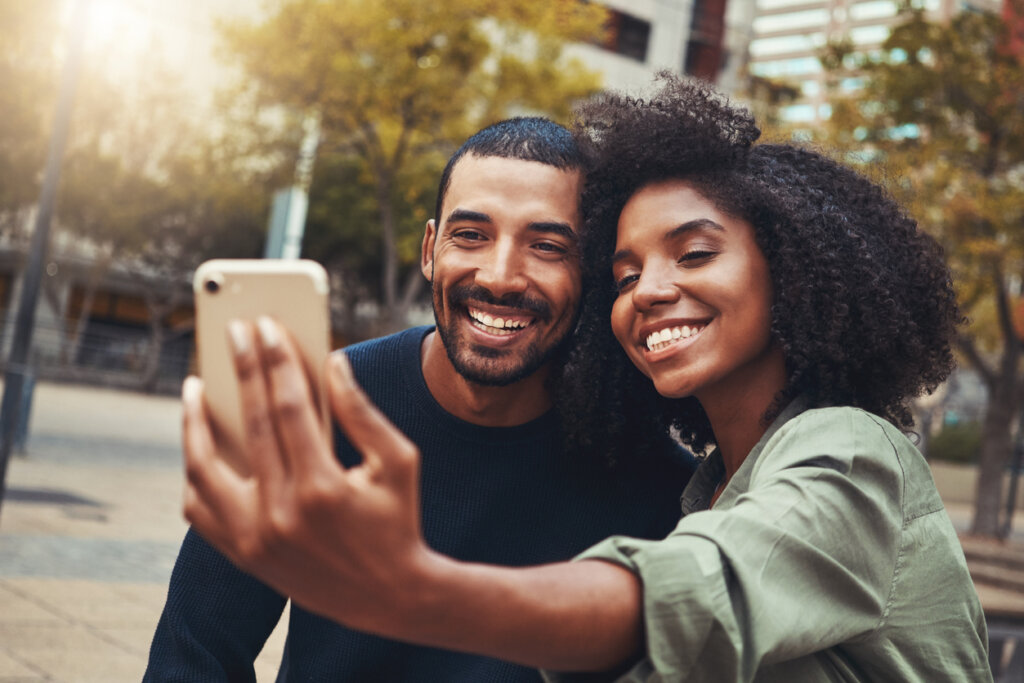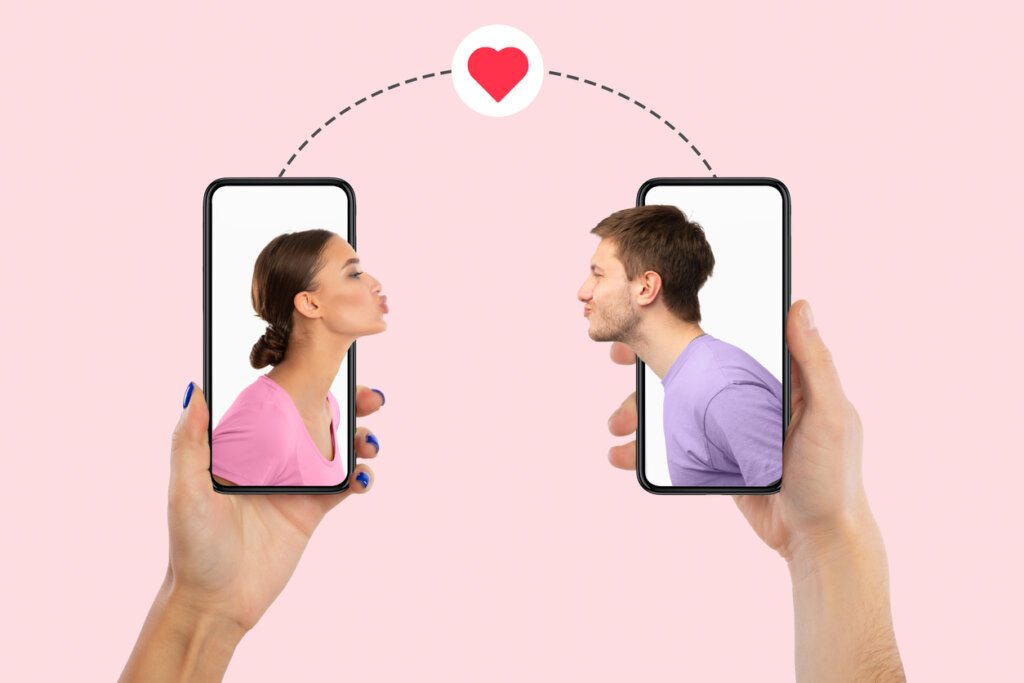Social Media and the Couple: The Current Love Triangle

Social media has recently become a mediator of love relationships. In fact, it seems that couples need social media witnesses as guarantors of their relationships. For this reason, these bonds are often spoken of as love triangles. That’s because social media intervenes in relationships almost as if it were a third party.
Many couples today meet in the virtual world. Therefore, the links they establish usually introduce a virtual component to the dynamics of their relationship. Nevertheless, it has important repercussions and lays the foundations for setting up a true love triangle.
The couple’s presence on social media makes it more difficult for each partner to maintain their own personal space. Indeed, in the virtual world, it’s complicated to know where the world of each individual begins and ends. In addition, it’s not uncommon for some couples to summon the kind of audience who ends up interfering with their relationship. This doesn’t help to strengthen their bond.
“The world enjoys the Internet as if it were a toy. Yet it is the most powerful weapon created by man.”
-Ruben Serrano-
Social media and the couple

Digital love, or love with a strong digital component, introduces the possibility of televising the relationship, practically live. In one corner is the couple, and in the other is a kind of audience that can request, or even demand information about what’s happening in the relationship. This completes the love triangle.
Within this dynamic, people often find themselves under pressure to successfully manage their own expectations and those of their partner but also to take into account those of their audience. They start to ask questions like: What’ll they say about us? How will they see us? This can end up conditioning their actions.
Furthermore, the need to photograph and share every moment online also points in the same direction. In fact, couples within this kind of dynamic might well feel that happiness doesn’t really exist if they don’t make others a part of it. Hence, there may come a time when their main points of reference are their social media witnesses.
There’s a tendency for them to record every event in their lives, whether large or small, with a photo. However, their aim isn’t to preserve it in their memories, but as a way of obtaining reinforcement from others.
Many social media profiles are a veritable collection of photos of the couple in different circumstances. It often means that the boundaries between the private and the public become blurred, making ‘the game’ even more tyrannical, cruel, and dangerous. This is due to the distortion of the reinforcements it produces in relation to the couple.
The implications of social media
Virtuality and the fact of being able to know where the other is at all times, masks many jealous attitudes. In this type of dynamic, it’s simple for one partner to keep track of the other.
Nevertheless, a really serious problem can appear when the jealous partner stops having access to this information. For example, when their partner decides to stop posting everything they do on social media or includes more people in their posts.
In many areas, including relationships, social media has become the space where everything and nothing is seen. It’s a fictional narrative of lives and relationships. Even so, it carries enough weight to give rise to a love triangle. That’s because, in effect, there’s a third party in the background of the relationship.
The effects of the love triangle

The love triangle that forms between social media and the couple is the cause and consequence of several features of current relationships. For instance, there’s increasingly less talk about falling in love or getting engaged and more about ‘relating’. In fact, the bond of a couple has ended up being played out in the image market.
The public exposure of the couple’s ups and downs ends up detracting from their intimacy. They’re not looking at each other, they’re not even looking in the same direction, but toward the same screen. Some couples even end up maintaining a relationship via posts, emojis, and never-ending online chats.
The general effect of this ecosystem is that relationships don’t last for so long. Furthermore, they’re superficial and less complicit. In addition, it’s extremely common for anxiety to appear because the public doesn’t always react in the way that one or both of the partners want. In other words, when the applause stops.
Social media has recently become a mediator of love relationships. In fact, it seems that couples need social media witnesses as guarantors of their relationships. For this reason, these bonds are often spoken of as love triangles. That’s because social media intervenes in relationships almost as if it were a third party.
Many couples today meet in the virtual world. Therefore, the links they establish usually introduce a virtual component to the dynamics of their relationship. Nevertheless, it has important repercussions and lays the foundations for setting up a true love triangle.
The couple’s presence on social media makes it more difficult for each partner to maintain their own personal space. Indeed, in the virtual world, it’s complicated to know where the world of each individual begins and ends. In addition, it’s not uncommon for some couples to summon the kind of audience who ends up interfering with their relationship. This doesn’t help to strengthen their bond.
“The world enjoys the Internet as if it were a toy. Yet it is the most powerful weapon created by man.”
-Ruben Serrano-
Social media and the couple

Digital love, or love with a strong digital component, introduces the possibility of televising the relationship, practically live. In one corner is the couple, and in the other is a kind of audience that can request, or even demand information about what’s happening in the relationship. This completes the love triangle.
Within this dynamic, people often find themselves under pressure to successfully manage their own expectations and those of their partner but also to take into account those of their audience. They start to ask questions like: What’ll they say about us? How will they see us? This can end up conditioning their actions.
Furthermore, the need to photograph and share every moment online also points in the same direction. In fact, couples within this kind of dynamic might well feel that happiness doesn’t really exist if they don’t make others a part of it. Hence, there may come a time when their main points of reference are their social media witnesses.
There’s a tendency for them to record every event in their lives, whether large or small, with a photo. However, their aim isn’t to preserve it in their memories, but as a way of obtaining reinforcement from others.
Many social media profiles are a veritable collection of photos of the couple in different circumstances. It often means that the boundaries between the private and the public become blurred, making ‘the game’ even more tyrannical, cruel, and dangerous. This is due to the distortion of the reinforcements it produces in relation to the couple.
The implications of social media
Virtuality and the fact of being able to know where the other is at all times, masks many jealous attitudes. In this type of dynamic, it’s simple for one partner to keep track of the other.
Nevertheless, a really serious problem can appear when the jealous partner stops having access to this information. For example, when their partner decides to stop posting everything they do on social media or includes more people in their posts.
In many areas, including relationships, social media has become the space where everything and nothing is seen. It’s a fictional narrative of lives and relationships. Even so, it carries enough weight to give rise to a love triangle. That’s because, in effect, there’s a third party in the background of the relationship.
The effects of the love triangle

The love triangle that forms between social media and the couple is the cause and consequence of several features of current relationships. For instance, there’s increasingly less talk about falling in love or getting engaged and more about ‘relating’. In fact, the bond of a couple has ended up being played out in the image market.
The public exposure of the couple’s ups and downs ends up detracting from their intimacy. They’re not looking at each other, they’re not even looking in the same direction, but toward the same screen. Some couples even end up maintaining a relationship via posts, emojis, and never-ending online chats.
The general effect of this ecosystem is that relationships don’t last for so long. Furthermore, they’re superficial and less complicit. In addition, it’s extremely common for anxiety to appear because the public doesn’t always react in the way that one or both of the partners want. In other words, when the applause stops.
All cited sources were thoroughly reviewed by our team to ensure their quality, reliability, currency, and validity. The bibliography of this article was considered reliable and of academic or scientific accuracy.
- Aristu, A. L. (2010). El amor en los tiempos de Internet. Critica: La Reflexion Calmada Desenreda Nudos, 60(966).
- Cornejo, M., & Tapia, M. L. (2011). Redes sociales y relaciones interpersonales en internet. Fundamentos en humanidades, 12(24), 219-229.
- Hurtado, C. M. G., & Bustamante, A. R. (2018). La comunicación en las relaciones de pareja mediadas por la virtualidad en tiempos de modernidad líquida. Latinoamericana de Estudios de Familia, 10(1), 11-30.
- Levis, D. (2006). Sobre chat, máscaras y otros asuntos sobre el amor en Internet. Teoría de la Educación. Educación y Cultura en la Sociedad de la Información, 7(2), 141-155.
- Verdés Bertolín, N. (2020). Enamorarse en el enjambre digital: relaciones virtuales y aplicaciones de citas.
This text is provided for informational purposes only and does not replace consultation with a professional. If in doubt, consult your specialist.







